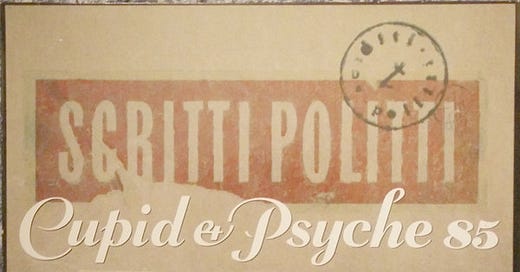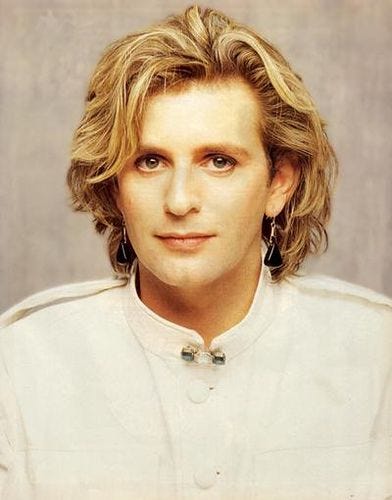The eighties have been such an exploratory decade in the field of music production, to the point where pop music has truly established itself as a question of technology as much as of music. Surely, it is always easy to be condescending to bygone historical attempts at innovating and front-running styles and trends within popular music, but an unprejudiced perspective is often likely to transform ‘kitsch’ eighties signifiers into fascinating leaps of sonic craft.
This technological advancement led to a weird occurrence in pop, where recognizing the effort involved in the craft of a musical piece became not just integral, but beneficial to its evaluation and the listening experience itself. This implies that the dense technicality of a creative procedure is not present for performative purposes, but rather carries an aesthetic impetus and is somehow deeply integrated into the essence of a musical piece. Scritti Politti’s breakthrough, transformative record “Cupid & Psyche 85” unequivocally falls into this strain of pop music, along with its single “Perfect Way” which, to this date, remains their most famous song in the United States, having stayed for 13 weeks at the Top 40 Hits Billboard Charts and eventually reaching the #11 position.
Scritti Politti is one of the great examples of rediscovery and transformation within a single artistic vision–in this case, belonging to Green Gartside, the group’s main thinking and conceptual force. Their recorded output can be appealing to just about any music listener for containing a notable scope of musical styles covered, this heterogeneity being closely tied to the ideological and philosophical shifts in Green himself, manifested throughout the project’s history. Having started as a dedicatedly Marxist squatter project,a group of more members than visible on stage, they reduced to a trio at the beginning of the eighties, with newly found pretensions towards occupying space in popular music. During this transition, reminiscent of a number of independent UK acts that helped spawn the “New-Pop” era as Paul Morley had coined it, Scritti had began incorporating elements of popular African-American music of the time - R&B,disco and funk. After a series of jagged, angular, independent single and EP releases on Rough Trade and Green’s breakdown and turn in thinking, their debut full-length Songs to Remember, marked their first serious step in this direction.
After Green made a connection through Rough Trade with an exceptionally talented composer and producer from New York, named David Gamson, and his friend drummer Fred Maher, they quickly indulged in a collaborative effort and began working on what would become “Cupid & Psyche 85”. After a painstaking and thorough creative and production process, they had spawned a revolutionary sounding pop record with numerous successful singles in the UK, which truly detached Scritti from their early post-punk days and established them as a legitimate and notable “pop” act. “Perfect Way” is the fifth and final single from this record and, along with “The Word Girl”, represents the culmination of ideas embedded into this project and its crowning achievement.
There is a deceiving quality to “Perfect Way”. On the surface, it is a sheenful, glossy mid-eighties love song. However, upon closer inspection, it becomes much more abstract and elusive; the lyrics forge a topic by means of love-song signifiers (the whole record is lyrically pretty much a game of lexical combinatorics,employing words like ‘heart’, ‘girl’, ‘love’, ‘lover’, etc. in all possible mutual variations) and addressing the “girl” in second person. In actuality, they’re simply giggle-inducing sonorous puns, the subtext of which is either too personal or esoteric to the average listener, therefore lost on him to the extent of creating a void in meaning. Funnily enough, they are some of the weirdly most frank and least theory-laden lyrics on the record – compared to “The Word ‘Girl’”, a song exposing the construct of a “girl” present in popular culture (as well as the implications of the word itself), “Perfect Way” seems to be an explication of emotion. If they are deconstructive, it is through play rather than rationale – which might had made it the least alienating among the singles from “Cupid & Psyche 85” and a reason why it made for such a hit in the United States.
“Perfect Way” might’ve sat better with American audiences than the post-structuralist reggae of “The Word Girl” that dominated the UK singles chart (Perfect Way had comparatively flaked in the UK, reaching only No. 48) is its uptempo, sample-infused synth-funk,anticipatory of the imminent “new jack swing” sound–one could also make a case that Jimmy Jam and Terry Lewis were paying attention to Scritti Politti’s latest work, which isn’t at all an absurd possibility.
David Gamson, with the occasional help from Gartside, was very present during this period in American mainstream pop music, having co-written, co-produced and arranged songs for Chaka Khan and Al Jerrau. Not only that, but traces of Scritti’s work could be heard in a variety of other music releases from the time and “Perfect Way” seemed to be the most inciting–most notably in the hilarious larceny of El DeBarge’s “Who’s Johnny”, but more complimentary in Miles Davis’ cover of “Perfect Way” on “Tutu”, released the following year. (Miles would proceed to collaborate with the band on their patchy follow-up record, “Provision”).
The music is a swift, densely-knit, modern iteration of “klangfarbenmelodie” – the concept of having a melody fragmented by taking its different parts and dedicating them to a variety of different “voices”or instruments. From a distance, it sounds like a normal synth-pop cut because of the effortless melodic continuity; in an attempt to deconstruct it, one’s mind melts under the pace at which the pointillist stabs of keyboards and samples shift responsibilities and clash off each other. However, music theory geeks are probably most likely to lose their mind over bridge, a nod to jazz in its cramming of numerous chords and modulations in a short time span. All of this would simply be a gimmick hadn’t it conveyed such a musicality and been so confidently executed. The stunning design of artificial spaces, the clarity of the sound mix –derived from sharp samples and FM-synthesized textures – an an articulated placement and organization of elements within it, the heavy-yet-tight drums, the musicality and groove in spite of the cold-blooded minuteness of digital technology and craft, as well as Green’s strong melodic sensibility, conducted through an alluring, androgynous timbre, all contributed in crafting a singular piece of pop music and, even though Scritti Politti have been reduced to a nerd/music-lover status with time, they were very visible for asplit second–and many were paying attention.





